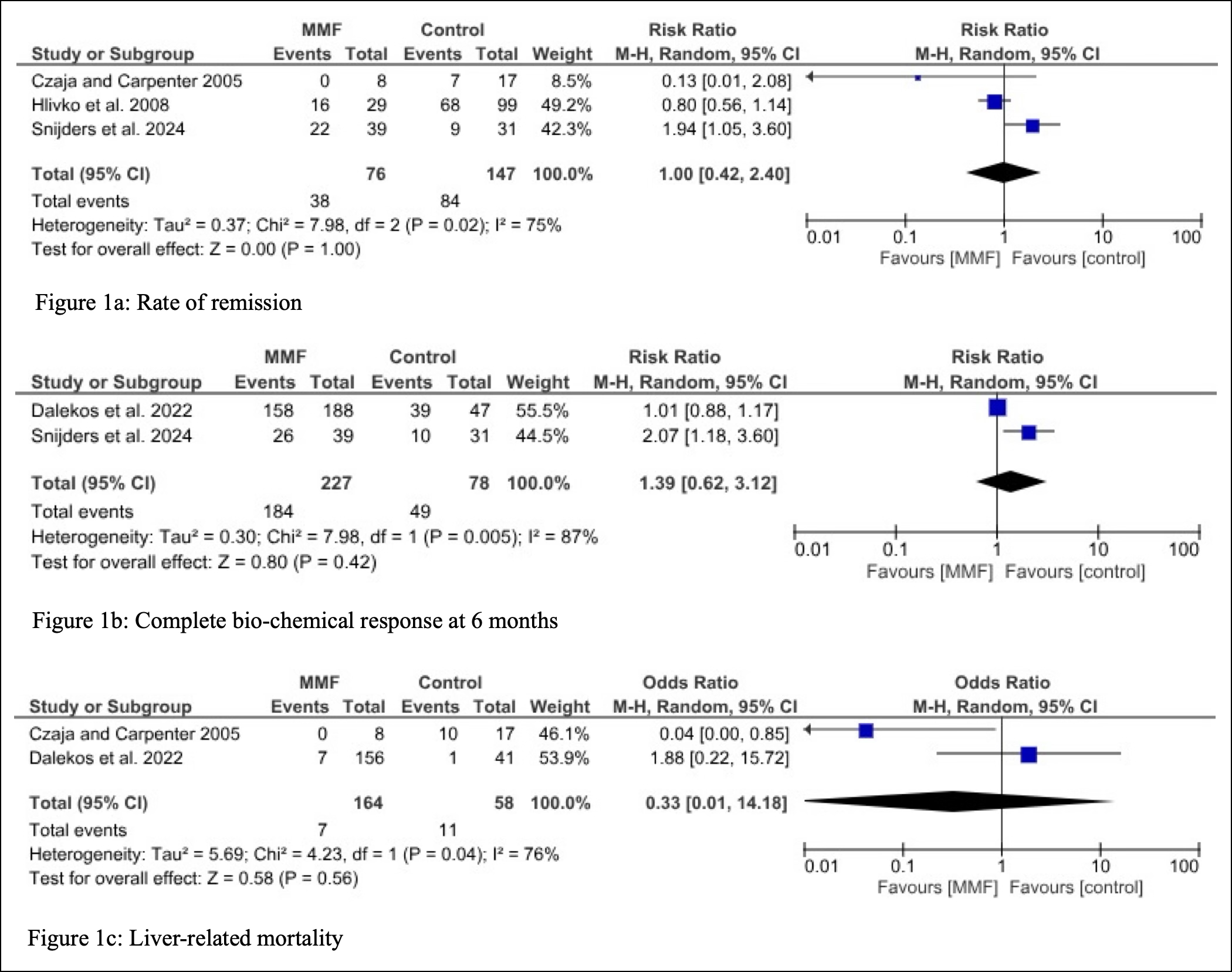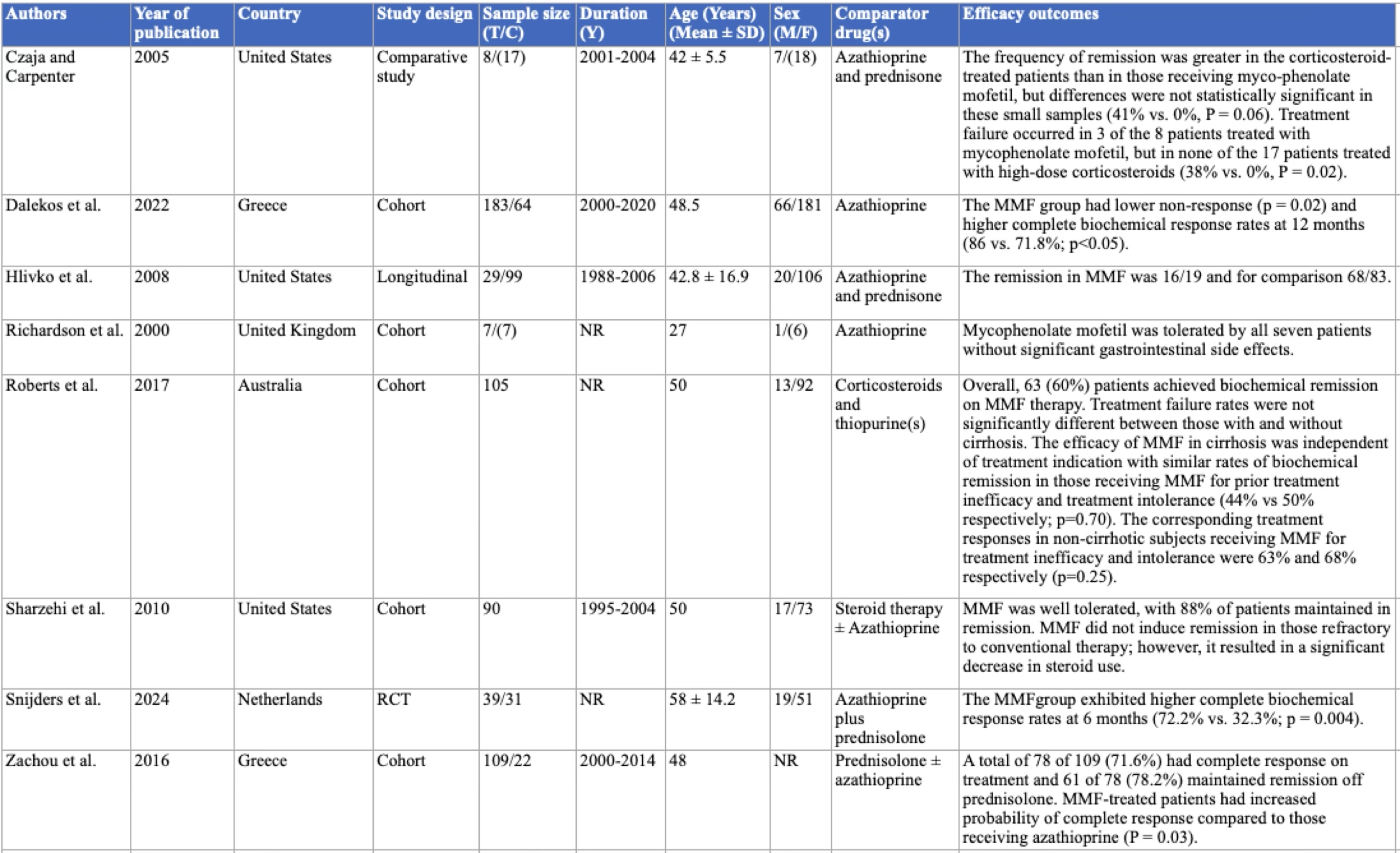Sunday Poster Session
Category: Liver
P1523 - Current Status of Immunosuppressive Therapies in Autoimmune Hepatitis (AIH): A Meta-Analysis of Clinical Outcomes
Sunday, October 26, 2025
3:30 PM - 7:00 PM PDT
Location: Exhibit Hall
- AK
Amita Kasar, MD (she/her/hers)
Poplar Bluff Regional Medical center
Bellevue , WA
Presenting Author(s)
Amita Kasar, MD1, Muaaz Masood, MD2, Prince A. Ameyaw, MD3, Sarpong Boateng, MD, MPH4, Shravya R. Ginnaram, MD5, Tarun Parvataneni, MD6, Mala Jain, MD7, Guy Loic Nguefang Tchoukeu, MD8, Umesh Bhanot, MD, PhD9
1Poplar Bluff Regional Medical center, Poplar Bluff, MO; 2Division of Gastroenterology and Hepatology, Center for Digestive Health, Virginia Mason Franciscan Health, Seattle, WA; 3Yale New Haven Health, Bridgeport Hospital, Bridgeport, CT; 4Yale New Haven Health, Bridgeport, CT; 5University of Nebraska Medical Center, Omaha, NE; 6Aiken regional Medical Center, Aiken, SC; 7Westchester Medical Center, Valhalla, NY; 8Texas Tech University Health Sciences Center, Odessa, TX; 9Memorial Sloan Kettering Cancer Center, New York, NY
Introduction: Autoimmune hepatitis (AIH) covers a range of clinical phenotypes that complicate its management. Azathioprine with or without corticosteroid remains the first line therapy for AIH while other options such as mycophenolate mofetil (MMF) is used in select patients as frontline or salvage therapy. Due to inconsistent reporting of clinical outcomes when using two drugs for AIH therapy, we conducted a meta-analysis to investigate efficacy of azathioprine and MMF in AIH patients.
Methods: The meta-analysis using RevMan 5.4 was conducted to evaluate outcomes such as complete biochemical response, remission rate and liver related mortality. We calculated risk ratios (RR) or odds ratios (OR), depending on the nature and frequency of events. The Mantel-Haenszel method was employed for pooling effect estimates, and a random-effects model to account for potential clinical and methodological heterogeneity across studies. Inclusion criteria was, randomized controlled trials (RCTs) and comparative cohort studies including adult patients with AIH, reporting related clinical outcomes.
Results: After searching through four databases, we selected a total of eight studies (including RCTs and cohort) [Figure 2]. We compared efficacy and liver related mortality in patients treated with MMF vs. Azathioprine. For the rate of remission pooled analysis demonstrated (RR = 1.00, 95% CI: 0.42 to 2.40, p = 1.00) [Figure 1a] indicating comparable likelihood of achieving remission. The data on complete biochemical response at six months following initiation of treatment shows (RR = 1.39, 95% CI: 0.62 to 3.12, p = 0.42) [Figure 1b]. The reported data on liver-related mortality among both groups showed (OR = 0.33, 95% CI: 0.01 to 14.18, p = 0.56) [Figure 1c]. All outcomes had high heterogeneity (I² = 75%, I² = 87%, I² = 76% respectively).
Discussion: Our study demonstrates that there are no statistically significant differences among both groups in rates of remission, complete biochemical response, and liver-related mortality in AIH. Confidence interval for all outcomes included the null value suggesting that current evidence does not support a clear advantage of MMF over azathioprine. Current literature has variable findings, some favoring MMF over azathioprine. Our results indicate that superiority of MMF over azathioprine in AIH remains uncertain. However, we recommend larger RCTs with long term follow up to establish potential differences between the two immunosuppressive therapies.

Figure: Forest Plots comparing MMF vs Standard Treatment (Azathioprine) in AIH

Figure: AIH Studies for Efficacy
Disclosures:
Amita Kasar indicated no relevant financial relationships.
Muaaz Masood indicated no relevant financial relationships.
Prince Ameyaw indicated no relevant financial relationships.
Sarpong Boateng indicated no relevant financial relationships.
Shravya Ginnaram indicated no relevant financial relationships.
Tarun Parvataneni indicated no relevant financial relationships.
Mala Jain indicated no relevant financial relationships.
Guy Loic Nguefang Tchoukeu indicated no relevant financial relationships.
Umesh Bhanot indicated no relevant financial relationships.
Amita Kasar, MD1, Muaaz Masood, MD2, Prince A. Ameyaw, MD3, Sarpong Boateng, MD, MPH4, Shravya R. Ginnaram, MD5, Tarun Parvataneni, MD6, Mala Jain, MD7, Guy Loic Nguefang Tchoukeu, MD8, Umesh Bhanot, MD, PhD9. P1523 - Current Status of Immunosuppressive Therapies in Autoimmune Hepatitis (AIH): A Meta-Analysis of Clinical Outcomes, ACG 2025 Annual Scientific Meeting Abstracts. Phoenix, AZ: American College of Gastroenterology.
1Poplar Bluff Regional Medical center, Poplar Bluff, MO; 2Division of Gastroenterology and Hepatology, Center for Digestive Health, Virginia Mason Franciscan Health, Seattle, WA; 3Yale New Haven Health, Bridgeport Hospital, Bridgeport, CT; 4Yale New Haven Health, Bridgeport, CT; 5University of Nebraska Medical Center, Omaha, NE; 6Aiken regional Medical Center, Aiken, SC; 7Westchester Medical Center, Valhalla, NY; 8Texas Tech University Health Sciences Center, Odessa, TX; 9Memorial Sloan Kettering Cancer Center, New York, NY
Introduction: Autoimmune hepatitis (AIH) covers a range of clinical phenotypes that complicate its management. Azathioprine with or without corticosteroid remains the first line therapy for AIH while other options such as mycophenolate mofetil (MMF) is used in select patients as frontline or salvage therapy. Due to inconsistent reporting of clinical outcomes when using two drugs for AIH therapy, we conducted a meta-analysis to investigate efficacy of azathioprine and MMF in AIH patients.
Methods: The meta-analysis using RevMan 5.4 was conducted to evaluate outcomes such as complete biochemical response, remission rate and liver related mortality. We calculated risk ratios (RR) or odds ratios (OR), depending on the nature and frequency of events. The Mantel-Haenszel method was employed for pooling effect estimates, and a random-effects model to account for potential clinical and methodological heterogeneity across studies. Inclusion criteria was, randomized controlled trials (RCTs) and comparative cohort studies including adult patients with AIH, reporting related clinical outcomes.
Results: After searching through four databases, we selected a total of eight studies (including RCTs and cohort) [Figure 2]. We compared efficacy and liver related mortality in patients treated with MMF vs. Azathioprine. For the rate of remission pooled analysis demonstrated (RR = 1.00, 95% CI: 0.42 to 2.40, p = 1.00) [Figure 1a] indicating comparable likelihood of achieving remission. The data on complete biochemical response at six months following initiation of treatment shows (RR = 1.39, 95% CI: 0.62 to 3.12, p = 0.42) [Figure 1b]. The reported data on liver-related mortality among both groups showed (OR = 0.33, 95% CI: 0.01 to 14.18, p = 0.56) [Figure 1c]. All outcomes had high heterogeneity (I² = 75%, I² = 87%, I² = 76% respectively).
Discussion: Our study demonstrates that there are no statistically significant differences among both groups in rates of remission, complete biochemical response, and liver-related mortality in AIH. Confidence interval for all outcomes included the null value suggesting that current evidence does not support a clear advantage of MMF over azathioprine. Current literature has variable findings, some favoring MMF over azathioprine. Our results indicate that superiority of MMF over azathioprine in AIH remains uncertain. However, we recommend larger RCTs with long term follow up to establish potential differences between the two immunosuppressive therapies.

Figure: Forest Plots comparing MMF vs Standard Treatment (Azathioprine) in AIH

Figure: AIH Studies for Efficacy
Disclosures:
Amita Kasar indicated no relevant financial relationships.
Muaaz Masood indicated no relevant financial relationships.
Prince Ameyaw indicated no relevant financial relationships.
Sarpong Boateng indicated no relevant financial relationships.
Shravya Ginnaram indicated no relevant financial relationships.
Tarun Parvataneni indicated no relevant financial relationships.
Mala Jain indicated no relevant financial relationships.
Guy Loic Nguefang Tchoukeu indicated no relevant financial relationships.
Umesh Bhanot indicated no relevant financial relationships.
Amita Kasar, MD1, Muaaz Masood, MD2, Prince A. Ameyaw, MD3, Sarpong Boateng, MD, MPH4, Shravya R. Ginnaram, MD5, Tarun Parvataneni, MD6, Mala Jain, MD7, Guy Loic Nguefang Tchoukeu, MD8, Umesh Bhanot, MD, PhD9. P1523 - Current Status of Immunosuppressive Therapies in Autoimmune Hepatitis (AIH): A Meta-Analysis of Clinical Outcomes, ACG 2025 Annual Scientific Meeting Abstracts. Phoenix, AZ: American College of Gastroenterology.

